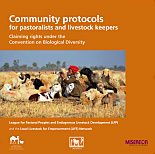 Biocultural Community Protocols (BCPs) are a tool embedded in the Nagoya Protocol on Access to Genetic Resources and the Fair and Equitable Sharing of Benefits Arising from their Utilization. In the context of animal genetic resources (AnGR), community protocols have an important role in (1) establishing the rights of a community over their breed and its continued utilization, and (2) laying the foundation for community-based in-situ conservation, by identifying the main actors as well as opportunities and threats.
Biocultural Community Protocols (BCPs) are a tool embedded in the Nagoya Protocol on Access to Genetic Resources and the Fair and Equitable Sharing of Benefits Arising from their Utilization. In the context of animal genetic resources (AnGR), community protocols have an important role in (1) establishing the rights of a community over their breed and its continued utilization, and (2) laying the foundation for community-based in-situ conservation, by identifying the main actors as well as opportunities and threats.
- Biocultural Community Protocols (BCPs) provide insight into livestock systems from the perspectives of the breeding communities. They make available valuable information that is not included in the formal scientific ‘breed descriptors’ which focus on phenotypical and production characteristics but omit local ground realities and challenges to the conservation of breeds. BCPs are the foundation for equitable access and benefit-sharing arrangements as mandated by the Nagoya Protocol and may be of special importance if global interest in livestock breeds with adaptive traits grows in the future. Therefore, BCPs should be recognized by the National Biodiversity Authority as the equivalent of Peoples’ Biodiversity Registers (PBRs) for nomadic pastoralists.
- The ‘BCP approach’ should be embedded in a cross-cutting national livestock policy that recognizes the role of livestock breeding communities at the junction between biodiversity conservation and food production and the importance of availability and access to common pool resources.
- Developing BCPs is a time-consuming process that requires special skills and participatory approaches. Training and capacity building is urgent and funds should be made available for this as well as for the development of BCPs.
Completed Project
- Asian Regional Initiative on BCPs
Publications
- Community Protocols for Pastoralists and Livestock Keepers. Claiming Rights under the Convention on Biological Diversity
- Biocultural Protocols for Livestock Keepers
- Biocultural community protocols: tools for securing the assets of livestock keepers
- Pashtoon Biocultural Community Protocols
- Recognising Customary Rights (Film):
More publications you will find here.

